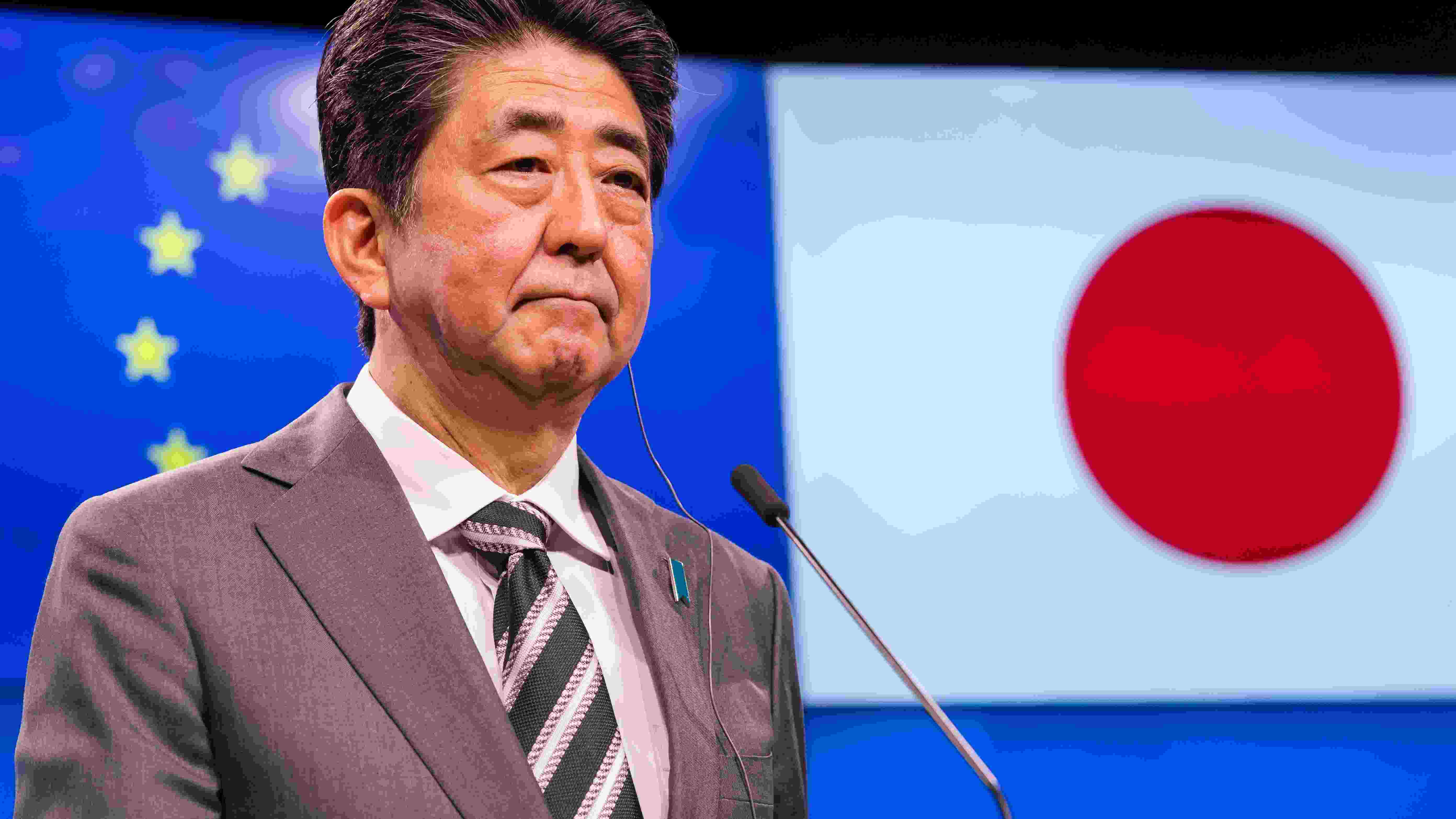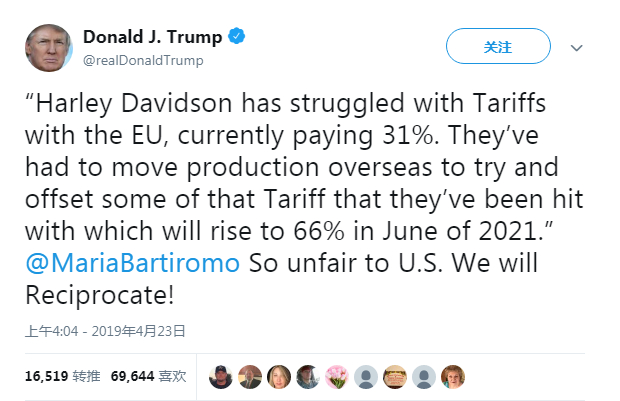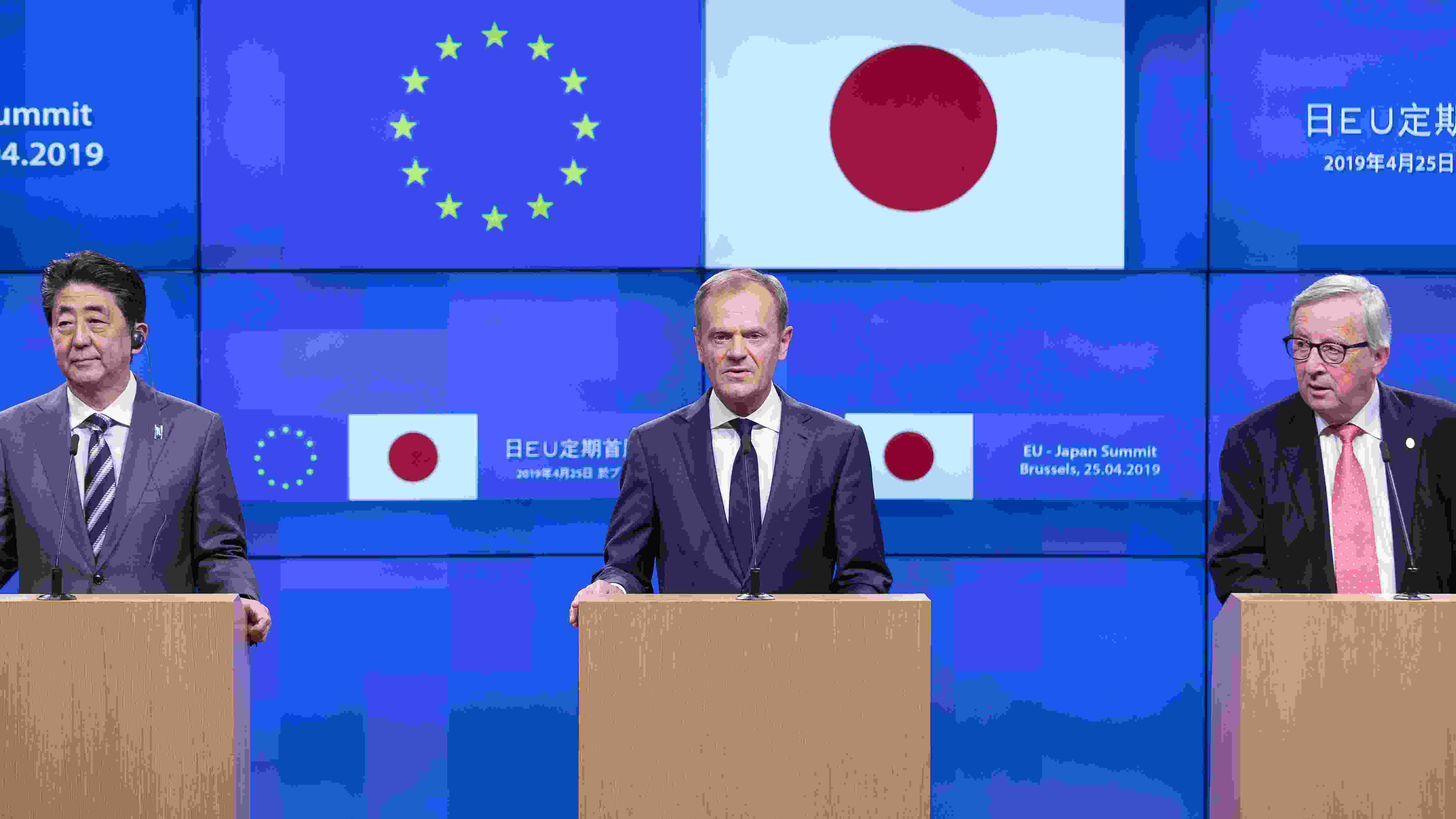
Opinion
22:17, 26-Apr-2019
Japan and EU against Trump's protectionism
Updated
22:35, 26-Apr-2019
Chris Deacon

Editor's note: Chris Deacon is a postgraduate researcher in politics and international relations at the University of London and previously worked as an international commercial lawyer. The article reflects the author's opinion, and not necessarily the views of CGTN.
"The name of the new imperial era in Japan, Reiwa, could also be used as a motto of EU-Japan relations." These were the words of European Council President Donald Tusk, concluding his remarks in a press conference with Japanese Prime Minister Shinzo Abe and European Commission President Jean-Claude Juncker Thursday.
These are indicative of the warmth in relations between Japan and the European Union (EU) in recent years, particularly in light of protectionist trade moves by U.S. President Donald Trump.
The press conference exhibited seemingly total harmony of approach to a variety of issues between Japan and the EU, including on the environment, the rule of law and concerns regarding the United Kingdom leaving the EU without a deal.
But most striking was the pointed words that both sides had regarding the protection of a free and fair international trading system. This was a clear signal to Trump that the EU and Japan stand united in opposition to his protectionist measures, especially the imposition of unilateral tariffs.

A screenshot from Trump's twitter.
A screenshot from Trump's twitter.
Trump's on-again-off-again "trade war" with China has perhaps received the most attention in the international press, but he has not been afraid to afford similar treatment to his supposed allies in the EU and Japan also.
The latest spat between the EU and the U.S. has related to Harley Davidson motorbikes, which had additional tariffs placed on them by the European Commission as retaliation against U.S. tariffs on the EU's own exports.
But at Thursday's press conference, the Japanese and European leaders were clear in their unity to avoid such measures, with Abe claiming that maintenance of the international free trade regime was the most important task of the international community at present.
This subtle but clear alliance on the protection of free trade comes as part of a growing closeness between the EU and Japan.
Earlier this year, a bilateral free trade agreement between the two - the Economic Partnership Agreement - came into force. This forms the world's largest trade agreement, covering roughly one-third of the global economy.
Defense and security cooperation has come more slowly, but this is perhaps unsurprising given the nature of the EU, which does not operate standing armed forces in the way that nation-states do, and Japan's own constitutional restrictions on its military activities.
That said, there has been cooperation in this regard between Japan and EU Member States, particularly the United Kingdom, whose armed forces have recently conducted multiple exercises and cooperative missions with Japan. (The UK is of course, however, due to leave the EU.)
Security cooperation between Japan and NATO - whose membership greatly overlaps the EU's - has also grown in recent years. Japan now has about as close a relationship with NATO as it is possible to have without actually being a member.

Japanese Prime Minister Shinzo Abe (L), President of the European Council Donald Franciszek Tusk (C) and the President of the European Commission Jean-Claude Juncker (R) talk to the media during a bilateral meeting in the Europa, the EU Council headquarters, Belgium, Brussels, April 25, 2019. /VCG Photo
Japanese Prime Minister Shinzo Abe (L), President of the European Council Donald Franciszek Tusk (C) and the President of the European Commission Jean-Claude Juncker (R) talk to the media during a bilateral meeting in the Europa, the EU Council headquarters, Belgium, Brussels, April 25, 2019. /VCG Photo
These moves form part of Japan's attempts to diversify itself away from total reliance on its security alliance with the U.S., as well as Prime Minister Abe's desires for Japan to take a more "proactive" approach in the region, and globally.
That said, Abe has hardly forgotten the U.S. In fact, this is where he has immediately flown after his European visit. He even arrived just in time to be a guest of honor at First Lady Melania Trump's birthday dinner on Friday and will play golf with Trump on Saturday.
Abe will also entertain Trump in Japan shortly, and has promised that the U.S. President will be the first foreign leader to meet with the new Emperor Naruhito after the abdication of Akihito at the end of this month.
In this regard, we can see that Abe is hedging his bets. Japan has always been fearful of U.S. abandonment, but under Trump, such fears are perhaps more pronounced than ever, given the President's capricious ways. Recent trade moves by the U.S. have added further fuel to this fire.
Abe, therefore, appears to be keeping Trump on-side as much as possible, while developing strong ties with the EU that he can make use of against U.S. trade policies as and when this might be necessary.
Given the EU itself takes a broadly similar position (although with some differences across its Member States), Japan is a useful partner. Indeed, with transatlantic relations troubled as they are, Japan is one of the closest friends that the EU could hope for presently.
In this way, close relations work well for both sides, and as long as the two are singing from the same hymn sheet as they did at this week's press conference, it appears that EU-Japan relations will only become closer in the near future. It remains to be seen, however, to what extent such an alliance will need to be deployed against the U.S. and President Trump.
(If you want to contribute and have specific expertise, please contact us at opinions@cgtn.com)

SITEMAP
Copyright © 2018 CGTN. Beijing ICP prepared NO.16065310-3
Copyright © 2018 CGTN. Beijing ICP prepared NO.16065310-3